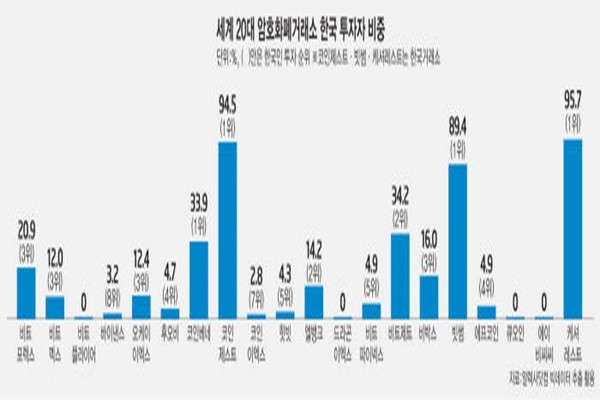As regulations on cryptocurrency trade continue to be tightened up in South Korea, many cryptocurrency investors are starting to look at exchanges in foreign countries. There was a net outflow of $26.9 billion (30 trillion KRW) to large foreign exchanges. It has become a reality where South Korean cryptocurrency exchanges and blockchain ecosystem have become dependent on foreign countries.
The Electronic Times investigated current status (ratio of South Korean investors) of top 20 global cryptocurrency exchanges through Amazon’s AI (Artificial Intelligence) platform called Alexa.com. In just 2 years ago, number of South Korean investors using foreign exchanges was almost nonexistent.
Alexa.com is a website measurement service operated by Amazon. The Electronic Times was able to calculate ratio of South Korean investors using different cryptocurrency exchanges through Alexa’s Big Data method.
Results were very surprising. BitForex, which is the top exchange based on exchange volume, has 20.9% of its investors from South Korea that is the third highest followed by Japan and the U.S. 12% of investors of BitMEX, which is in the second place based on exchange volume, is from South Korea that is also the third highest.
3.2% of Binance’s investors is from South Korea which is the eighth highest while 12.4% of OKex’s investors is from South Korea which is the fourth highest.
Number of South Korean investors for exchanges that are placed between sixth and tenth places based on exchange volume has increased by a lot as well. Ratios of investments from South Korea for Huobi, Coinex, and HitBTC are 4.7% (fourth), 2.8% (seventh), and 4.3% (fifth) respectively. Ratios of South Korean investors for South Korean exchanges such as Coinzest and Coinbene are 94.5% and 33.9% respectively and they are easily the highest percentages.

Ratios of South Korean investors for exchanges that are placed out of top 10 also showed increase in percentages.
Ratios for Bibox, Bit-z, LBANK, Bitfinex, and Fcoin are 16% (third), 34.20% (second), 14.2% (second), 4.90% (fifth), and 4.9% (fourth) respectively.
One of biggest South Korean exchanges called Bithumb has 89.4% of its users from South Korea. 95.7% of investors of Cashierest are also South Koreans. While there are not much foreign investors using South Korean exchanges, there is a huge increase in number of South Korean investors using foreign exchanges.
Fact that it is difficult to use financial services in actual markets due to strict regulations and that there is reduction of Kimchi Premium are reasons why South Korean investors turning their heads towards foreign exchanges.
Investors who are using large exchanges such as Bithumb and Upbit are starting to feel fatigued as they cannot receive new accounts and are constantly under investigations and as South Korean Government is looking at large exchanges under microscope.
As South Korean companies and investors are starting to turn to foreign countries due to strict regulations, it is expected that it will be difficult for South Korean Government not to face loss of opportunity costs and national wealth.
“We are at a point where there will not be private funds left to establish blockchain ecosystems in South Korea anymore as companies and individuals are leaving South Korea.” said a high-ranking official for a large exchange. “It will be possible that there will not be relevant businesses in South Korea anymore as there are strong negative views towards South Korean exchanges that are accused of profiting from expensive fees.”
Staff Reporter Gil, Jaeshik | osolgil@etnews.com